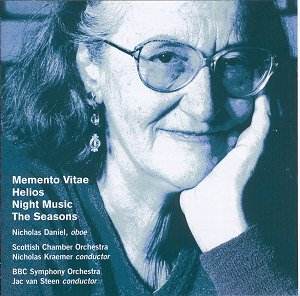Memento Vitae, which is new to
the catalogue, is one of the many scores written for Beethoven
year in 1970. Other such works include Boucourechliev’s Ombres
and Paul Tortelier’s Offrande, to name but two.
The subtitle of the Musgrave work ‘Concerto in Homage to Beethoven’
fairly aptly describes what we hear. This is a brilliant concerto
for orchestra replete with quotations of or allusions to Beethoven’s
music. These are embedded into Musgrave’s own personal sound world.
These quotations or allusions are of more than purely anecdotal
significance and the music never falls into blunt parody or pastiche.
The global impact of this gripping and colourful score is of utmost
sincerity and honesty, and often of deep inner turmoil. Significantly
enough, the piece ends in utter desolation and the final lament
is deeply moving.
The other pieces have been released several years
ago, on COLLINS 15292, and thus make a most welcome return to
the catalogue. The magnificent Night Music is, I
believe, one of her finest works: contemporary, "modern"
without any ostentation or any trendy "gimmicks" if
we except the fact that the horn players are instructed to move
around the orchestra. This is an effect in much in the same way
as that demanded of the clarinettist in the superb Clarinet
Concerto of 1968. At the very end of the piece one of
the horn players moves off-stage. Musgrave describes Night
Music as "a dream landscape" which is what the
piece really is. The nocturnal mood is thoroughly and beautifully
embodied by the horns which stand out in a clearly concertante
role. These are wonderfully played by Robert Cook and Harry Johnstone,
otherwise uncredited in the insert notes.
Helios, composed in 1994, is the
most recent work here. The myth of Helios (or its astrological
or geographical associations) has long inspired composers from
Saint-Saëns (Phaeton) to Paul Ruders (Corona)
or Christopher Rouse (Phaeton) while not forgetting
Nielsen or the late William Mathias. This is a beautifully crafted
piece of some substance, superbly evocative without being blandly
picturesque. It is a worthy successor to Musgrave’s earlier concertos.
The Seasons was commissioned by
the Academy of St Martin-in-the-Fields and first performed by
them in 1988. Its basic ideas are related to a number of paintings
without being overtly programmatic. Drama is achieved through
some brief quotations (Dies Irae, The Star Spangled Banner,
La Marseillaise and from Musgrave’s opera Harriet, the
Woman called Moses) though these are always very discreetly
hinted at. This is another colourful, appealing score that deserves
to be better-known although it may not have the wealth of invention
found in the other works recorded here.
The present release, part of NMC’s new ongoing
Ancora series, gives a good idea of what to expect. The
series will deliver reissues of worthwhile recordings as well
as releases of some material hitherto unavailable. Excellent performances
by all concerned and production well up to NMC’s very best. You
no longer have any excuse if you missed the original releases.
Hubert Culot
see also
review of original and related releases by Len Mullenger
Thea
Musgrave by Francis Routh
